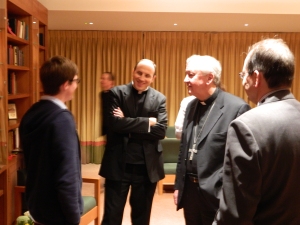29 February
2012
Seeking Conflict?
Posted in British Politics, Christianity, Conscience, Marriage & Family, Religion
In August 2011 a cross-party group of MPs and Peers called Christians in Parliament set up an inquiry into the freedom of Christians. Its preliminary report, Clearing the Ground, was published on Monday. The need of such an inquiry was felt due to media reports of Christians feeling that the law was discriminated against them. A Blog for all Seasons has hitherto commented upon some such stories, and also upon religious freedom more generally under current law. Recent Acts of Parliament have resulted in the judiciary passing judgements on the right of believers to act in specific cases in accordance with their faith.
As the United Kingdom is historically Christian, with legislation and culture formed over centuries by the tenets of that belief, conflicts between religious belief and secularist positions almost invariably involve Christianity. The census of 2001 had 71 percent of respondents describe themselves as Christian, whilst 44 percent so described themselves in the 2010 British Social Attitudes Survey. It is also the case, of course, that followers of Judaism and Islam may experience tensions between their beliefs or practices and projected/actual regulation, for example over marriage.
Clearing the Ground presents some interesting, perhaps unexpected, points such as the following:
Taking a public stand can sometimes achieve more in terms of raising funds than making a positive difference. Making noise is not the same as having influence, and to the frustration of many parliamentarians and church leaders, the campaigning approach of choosing cases to lose valiantly is not conducive to affecting political and social change.
The report goes on to treat ‘aggressive and amateur’ responses of some Christians to proposed or introduced legislation. It is only fair, perhaps, to acknowledge that a few cases of alleged ‘conflicts of rights’ have been taken out of proper context. It is also the case, however, that some of a secular and atheistic disposition actively seek fields in which to do battle with religion. The case involving Bideford town council is a recent example. The National Secular Society website reports further attempts to have prayers excised from council business in Sandbach and Winchester. The parish council in Cheddar has prayers just before official council business begins, such that they are not part of formal business, yet one councillor wants them to be held at least ten minutes prior to the meeting. The tone of the National Secular Society is hostile to religion. It reports gleefully reported declines in weekly attendance for assorted denominations, and dislikes the Czech government’s decision to return confiscated Church property.
Whilst some Christians may act in such a manner as to provoke conflict, the same tendency among secularists should surely be recognised. Much of the tension over the rights of Christians to live according to their consciences, however, has arisen only after the passing of government-backed legislation that violates such rights. Catholic adoption agencies were refused the right not to place children with homosexual couples. The agencies did not seek conflict with the State, but were placed in an impossible situation by legislation.
The report concludes that it is ‘critically important that Christians respond rather than react to the challenges they face’. The ideas seem generally sound, with useful proposals for both government and Christians. It suggests the latter should seek to be defined by what they envisage as good rather than by what they oppose. This may prove good guidance for Christian engagement with the now seemingly inevitable Bill for same-sex marriage. As recent events and discussions have shown, religious literacy cannot be taken for granted. It is therefore essential that people of faith intervene in the public square in a manner likely to engage both politicians and the public at large. The fundamentals of the common good must be positively presented and defended.

Leave a Reply to jthauthor Cancel reply